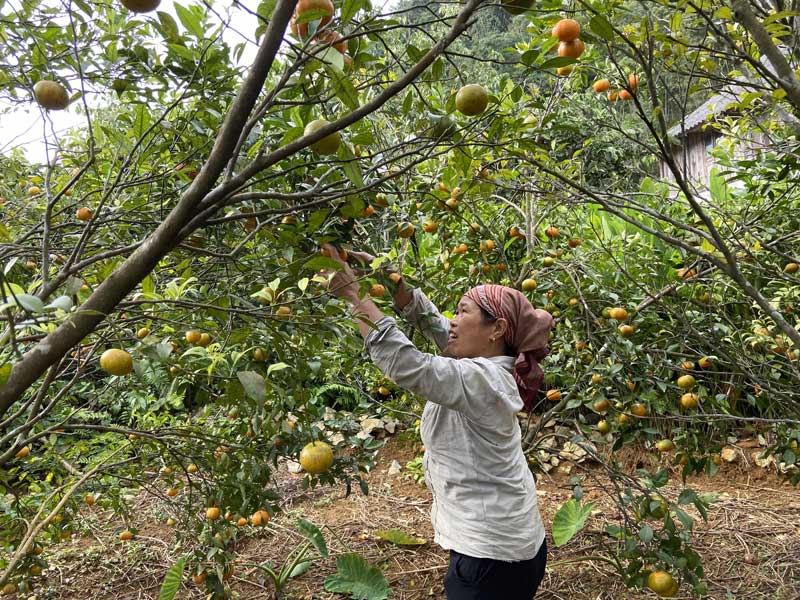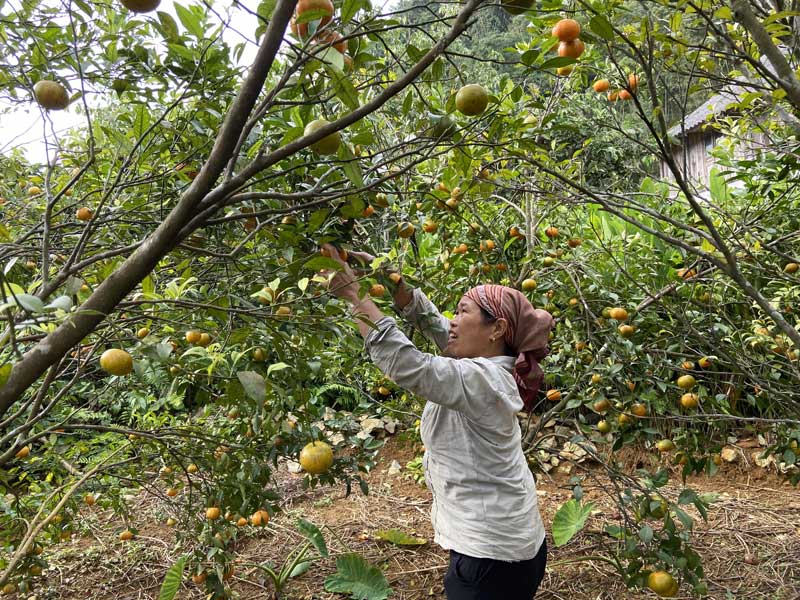
(HBO) – Over the last four years, farmers across Thung Khe commune (Mai Chau district) start bustling round to harvest tangerine when October arrives. The fruit, which is thin-skinned and very sweet, is usually in season from October through late December.
Growers here
only use safe, natural farm inputs with no harmful chemicals on tangerine farms.
Though tangerine trees in Thung Khe began to bear fruits only four years ago, the trees have proved their
high economic value, providing extra income to the locals.
 Farmers in Thung Khe village, Thung
Khe commune (Mai Chau) pick tangerines in their gardens.
Farmers in Thung Khe village, Thung
Khe commune (Mai Chau) pick tangerines in their gardens.
Since 2013,
authority of Thung Khe commune has encouraged local farmers to shift from
low-yield crops to tangerine, which suits the local soil and
climate conditions.
The farmers
has bought saplings from
other localities, such as Hoa Binh’s Cao Phong district and Ha Giang province and
later been trained by local agriculture promotion officals on how to use
fertiliser and take care of the tangerine.
Biofertiliser
and natural farm inputs are used
in all tangerine areas so the tangerine has been favoured by consumers.
At this time,
tangerines are being sold by farmers along Highway 6. It is also purchased in a
large quantity by traders from Mai Chau, Tan Lac, Hoa Binh City. The tangerines
fetch 20,000 VND per kg at the farm and 25,000 – 30,000 VND per kg at the
market.
Tangerine
areas in the commune have been expanded to 5 hectares, including 2 hectares being
in harvest season, said Chairman of the Thung Khe commune’s People’s Committee
Ha Van Hung. Many local households have got better off thanks to the
fruit, earning 60 million – 100
million VND annually.
The commune
plans to continue encouraging more farmers to shift to high-yield crops like
tangerine and provide technical training for farmers to boost the fruit’s yield and quality.
It will also
coordinate with local authorities and agencies to seek broader market for the
tangerine./.
According to data from the Hoa Binh Provincial Party Committee, the industrial production index for the first six months of 2025 is estimated to have increased by 20% compared to the same period last year. This marks the highest year-on-year growth rate for this period since 2020.
In the first six months of 2025, Hoa Binh province’s export turnover was estimated at 1.145 billion USD, marking an 18.11% increase compared to the same period in 2024. Import turnover was estimated at $ 804 million, a 17.15% increase, which helped the province maintain a positive trade balance.
The lives of the ethnic minority farmers in Tan Lac district have gradually improved thanks to the new directions in agricultural production. This is a testament to the collective strength fostered through the professional associations and groups implemented by various levels of the district’s Farmers’ Union.
With the motto the "product quality comes first,” after nearly one year of establishment and operation, Muong village’s Clean Food Agricultural and Commercial Cooperative, located in Cau Hamlet, Hung Son Commune (Kim Boi district), has launched reputable, high-quality agricultural products to the market that are well-received by consumers. The products such as Muong village’s pork sausage, salt-cured chicken, and salt-cured pork hocks have gradually carved out a place in the market and they are on the path to obtaining the OCOP certification.
In the past, the phrase "bumper harvest, rock-bottom prices" was a familiar refrain for Vietnamese farmers engaged in fragmented, small-scale agriculture. But today, a new spirit is emerging across rural areas of Hoa Binh province - one of collaboration, organisation, and collective economic models that provide a stable foundation for production.
Maintaining growing area codes and packing facility codes in accordance with regulations is a mandatory requirement for agricultural products to be eligible for export. Recently, the Department of Agriculture and Environment of Hoa Binh province has intensified technical supervision of designated farming areas and packing facilities to safeguard the "green passport" that enables its products to access international markets.



 Farmers in Thung Khe village, Thung
Khe commune (Mai Chau) pick tangerines in their gardens.
Farmers in Thung Khe village, Thung
Khe commune (Mai Chau) pick tangerines in their gardens.